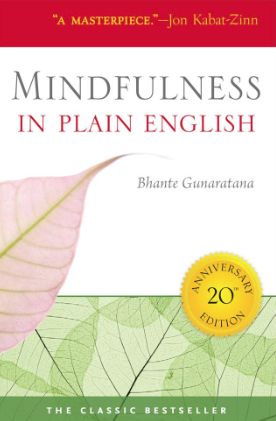“Meditation is not easy. It takes time and it takes energy. It also takes grit, determination, and discipline. It requires a host of personal qualities that we normally regard as unpleasant and like to avoid whenever possible.”
These are the opening lines of Bhante Henepola Gunaratana’s book Mindfulness in Plain English.
The ego views meditation as just sitting and doing nothing. What could be difficult about that? Everyone can just sit and do nothing.
When the beginner meditator starts with the practice, they quickly find out that this isn’t true. Sitting and doing nothing is actually quite difficult. The beginner meditator then does something that does come easily and that is turning to the conditioned human response of just assuming that something is inherently wrong with them.
“Meditation is not easy.” And why should it be easy?
“The purpose of Vipassana meditation is nothing less than the radical and permanent transformation of your entire sensory and cognitive experience.”
So, this practice of sitting quietly with ourselves, by ourselves or with a group requires an equal amount of firm discipline to return to the practice even when we don’t want to and an equal amount tender compassion for the fact that we often find this hard and may even feel inadequate and not up to the task.
I was recently introduced to the expression, “You can’t heal what you can’t feel” and I feel this is what is at the core of meditation being a transformational experience.
Gunaratana explains; “You can’t make radical changes in the pattern of your life until you begin to see yourself exactly as you are now. As soon as you do that, changes will flow naturally.”
At my first meditation retreat I was relieved to learn that I didn’t have to act on or believe every thought that runs through my head. There was nothing wrong with unpleasant experiences and I didn’t have to keep running from or blaming myself for them.
I saw clearly that I wasn’t looking for enlightenment or a direct path to Nirvana, I just wanted not to feel so desperate; not to feel like I couldn’t make it through the day and especially not to yell at my children and loving partner as much. As Gunaratana puts it, I was looking for “a more efficient way to take out the trash and better ways to deal with Uncle Herman.”
So, how do we find this better way to respond to our daily lives instead of just reacting to whatever is in front of us?
Gunaratana says, “Accept your experiences, even the ones you hate. Don’t condemn yourself for having human flaws and failings. Learn to see all the phenomena in the mind as being perfectly natural and understandable.”
This is the true meaning of mindfulness—letting go of our constant judgments of right and wrong and finding an unconditional self-regard for everything that arises. The practice of mindfulness—sitting quietly for a small amount of time each day and paying attention to what arises in that time—is a way to strengthen the muscle of being aware so that we can do it in the rest of our lives.
The actual period of meditation practice gives us a microcosmic view of the rest of our life. The work we do in accepting what arises during our time meditating will spill over into accepting what arises in all areas of our lives.
Gunaratana reminds us, “Through meditation, we become aware of ourselves exactly as we are, by waking up to the numerous subtle ways that we act out our own selfishness. Then we truly begin to be genuinely selfless. Cleansing yourself of selfishness in not a selfish activity.”
For myself, when I can’t find the motivation to sit meditation for myself I can be inspired through a desire the benefit the world as a whole. And this selfless practice is not limited to the time we sit quietly on our pillow or chair.
“Ideally, meditation should be a twenty-four-hour-a-day practice. This is a highly practical suggestion.”
The goal of meditation might not be to attain enlightenment or be attain ultimate perfection instead Gunaratana clearly expresses that the purpose of meditation practice is to be mindful not just during the meditation practice but all the time.
Love elephant and want to go steady?
Sign up for our (curated) daily and weekly newsletters!
Apprentice Editor: Dana Gornall / Editor: Renée Picard
Photo Credit: Author’s website











Read 0 comments and reply